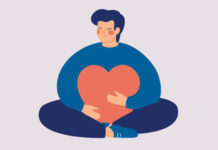
Lasting lifestyle changes can make for a healthier heart, says Dr. Edward Healy, a cardiologist who is vice chairman of the medical staff at Suburban Hospital in Bethesda. He recommends dietary changes and incorporating physical activity into your daily regimen.
Build activity into your regular routine
“I don’t like to use the word exercise or even diet,” Healy says. “People can be intimidated by the idea of exercise or they think they are going to have to join a gym or buy equipment. It’s really about incorporating activity into your life, whether it’s walking or biking places instead of driving. Take the stairs instead of the elevator. Join a basketball team or play tennis. There are all different ways to do it. It’s more important that it’s something that’s available to you and that you enjoy doing it.”
Pay attention to mental health and stress
“We know that stress releases hormones that are not good for the cardiovascular system. When people get stresses, their blood pressure tends to rise and they have a higher incidence of heart disease.” Healy recommends meditation, yoga, breathing exercises, all of which have a beneficial cardiovascular effect.
Banish salt and sugar from your diet
“We get tons of salt and sugar from the things we eat,” Healy says. “The more we can do without it the better. Sodium intake raises blood pressure and sugar is one of the main culprits in obesity. These are calories we don’t generally need.” A sugar-laden diet also raises your risk of cardiovascular disease even if you aren’t overweight.
Cook for yourself
“The more you cook for yourself, the more you prepare your own food, the more you have control over what you’re eating,” Dr. Healy says. “You know exactly what goes into that food. It’s easier to control the amount of salt and sugar in your diet and incorporate healthy foods. Your own food will be more nutritious and contain fewer calories.
Eat more vegetables
“Vegetables should really be at the center of your diet, not something on the side. Vegetables are high in vitamins, low in calories and high in fiber. They’re also high in potassium and low in sodium. Heart-healthy foods are high-fiber (whole grains, fruits and vegetables) and certain foods that are low in saturated fat like olive oil and fish.
Get tested
“Make sure you get your blood pressure, cholesterol and hemoglobin checked. Those are three risk factors that we have a way of measuring and we have things we can do to improve it. So, it’s good to know where you stand with those.” One of the tests is a C-Reactive Protein Test (CRP), which is a good predictor of heart disease.
Quit smoking
“If you’re smoking, work on quitting. We’re fortunate in this area that we don’t have as high a density of people who smoke, but quitting is definitely good for overall health, especially for cardiovascular health,” Dr. Healy said. The Food and Drug Administration states that breathing in cigarette smoke distributes contaminated blood to the rest of the body. These chemicals can damage your heart and blood vessels.
Restrict alcohol
“Restricting alcohol is good for your blood pressure and weight,” Healy says. New U.S. dietary guidelines recommend that individuals lower their consumption to one drink a day.
“Changes are not going to happen overnight,” Dr. Healy says. “I think sometimes people get discouraged and things aren’t going according to plan. But the key is really sticking with trying to lead a healthy cardiovascular life.”




